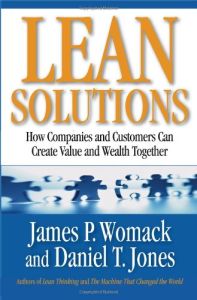Join getAbstract to access the summary!

Join getAbstract to access the summary!
James P. Womack and Daniel T. Jones
Lean Solutions
How Companies and Customers Can Create Value and Wealth Together
Free Press, 2005
What's inside?
Products are better and cheaper, but consumers don`t like working so hard to get them. Why consumption must get lean.
Recommendation
Authors James P. Womack and Daniel T. Jones were early proselytizers for the lean production philosophy, a set of "waste-not-want-not" principles that most businesses now accept. But good business requires more than efficient production. Noting that consumers are still not happy, despite an abundant supply of high-quality, low-cost products, the authors now have subjected consumption to "lean" analysis as well - and they’ve found that consumption is as inefficient as production used to be. Consumers face lengthy delays, unhelpful "help" lines, ineffective service representatives, and other annoying and costly wastes of time and energy. getAbstract recommends this book to managers who want to boost their customers’ satisfaction by applying lean principles to consumption as well as to production. Here’s how and, even more important, why.
Summary
About the Authors
James P. Womack is president and founder of a nonprofit organization focusing on lean approaches in Brookline, Massachusetts. Daniel T. Jones is chairman and founder of a nonprofit organization that teaches lean business approaches in the U.K.




















Comment on this summary